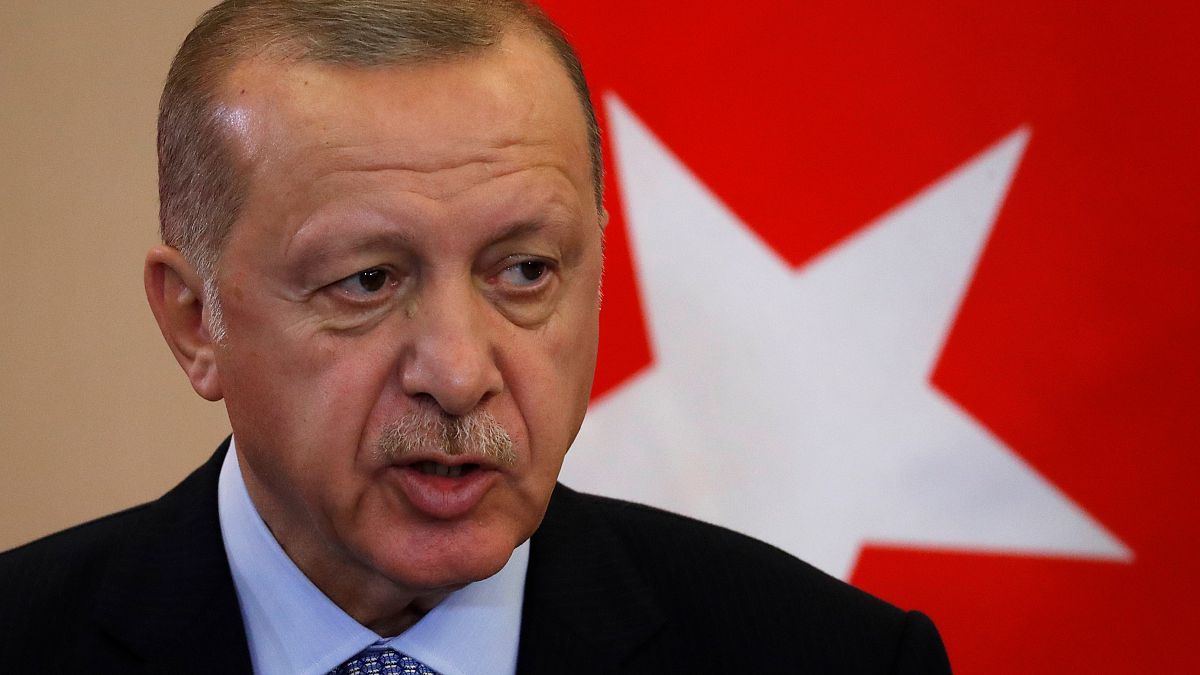Turkey will resume military operations "with determination" after a US-brokered ceasefire expires later on Tuesday if promises given by Washington have not been kept, President Tayyip Erdogan said ahead of the visit.
Russian President Vladimir Putin and his Turkish counterpart Tayyip Erdogan are holding talks in the Black Sea resort of Sochi on Tuesday as a US-brokered ceasefire in northeast Syria is due to expire.
Turkey will press on with its military operation in northeast Syria "with determination" if promises given by Washington have not been kept, Erdogan said ahead of the visit.
Turkey says all Kurdish YPG militia forces must leave a "safe zone" it wants to establish along a section of its border with Syria.
Ankara views the YPG as terrorists with links to Kurdish insurgents operating in southeast Turkey.
Erdogan also said he would discuss with Russian President Vladimir Putin how a Syrian constitutional committee that is due to meet in late October can make concrete progress.
The Kremlin said it hoped Erdogan would be able to provide more information about Ankara's plans for northern Syria.
What is at stake in these bilateral talks? Euronews interviewed international policy experts to find out.
Russia 'filling vacuum' left by west
The fact that Erdogan goes to Putin at the height of the crisis shows how central Moscow has become in the Syrian conflict.
"The Russians are the pivotal players because they are the one country speaking to all the different actors," said Julien Barnes Dacey, director of the Middle East & North Africa Programme at the European Council on Foreign Relations.
"Putin has succeeded in looking at both his relationship with Assad but also with Turkey in an extremely strong fashion. And now he offers the Kurds perhaps the only way of mediating between these two actors. "
"I think Putin wants to use the meeting to try and lock Erdogan into his wider vision of the Syria settlement, one that probably involves acknowledging Assad's continued rule," Barnes Dacey said.
"The Russians are in a sense filling the vacuum created by the US departure. While Russia has doubled down on its commitment to Syria, all the western players have continually looked for an exit strategy, one that's now being consolidated by Trump's decision," Barnes Dacey told Euronews.
"Erdogan does not want to break off relations with Moscow"
According to Russian expert Dmitry Suslov of the Valdai Discussion Club, Putin and Erdogan may agree on securing a new status quo in Syria that will last indefinitely and which will include Turkish occupation of a 30-kilometre zone along the border and eviction of the Kurdish population.
“Erdogan needs to secure the consent of Russia for its military operation, more precisely for the establishment of Turkish control along the border, since he does not want to sever relations with the Russian Federation."
"Ankara is not interested in an open clash with either Moscow or Damascus since in the latter case it would also mean tensions with Russia," Suslov said.
Kirill Semenov of the Russian Union for International Affairs told Euronews that Ankara and Moscow will most likely discuss the parameters of the buffer zone - will it be increased to 300-400 kilometres in length or will both sides agree on a more limited area of 150 kilometres?
Moscow refrains from criticising Ankara
Orkhan Gafarli, a Turkish political scientist, noted that Russia had so far refrained from criticising Ankara. According to the expert, the Kurd's decision to strike a deal with Damascus and end cooperation with Washington serves Moscow's interests well.
In addition, Moscow is pleased that oil-rich Kamyshly, Manbij and Kobani fell under Damascus' control.
Other topics of discussion will likely include the situation in Idlib and Hayat Tahrir al-Sham, the jihadist alliance currently controlling the region, experts told Euronews.
Talks on Idlib will be very difficult, Gafarli warned, because the parties have yet to determine which of the groups operating in the area are radical and who will control Idlib.
In the future, Damascus, Moscow and Ankara may agree to conduct a joint operation against Idlib groups affiliated with al-Qaeda, he said.
Double-edged sword
According to Suslov, the transition of the Kurds under the control of Damascus is beneficial to Ankara, since Turkey is not interested in the emergence of an independent Kurdistan.
However, Semenov warned the current situation may feel threatening to Turkey if Kurdish entities become part of Syrian government forces. Yet direct clashes between Syrian and Turkish armies will most likely be avoided since Russia will not allow it.
"To resolve the situation in Syria, the Russian-Turkish dialogue is vital"
"The prospect of resolving the situation in Syria arose only after Turkey stopped combatting the Assad regime and actually switched from the American to the Russian coalition, and after the Astana group was formed," Suslov said.
Of all Syria’s neighbours, Turkey is the most powerful country from a military point of view. For Ankara, ensuring national security is inextricably linked with the situation in Syria. According to Suslov, this means that the settlement of the Syrian crisis largely depends on the cooperation of Moscow and Ankara.
Yet, the expert warned, there are risks involved, including massive population displacements as the Kurds flee Turkish military operations.
